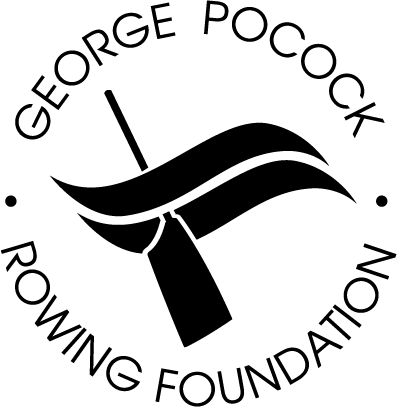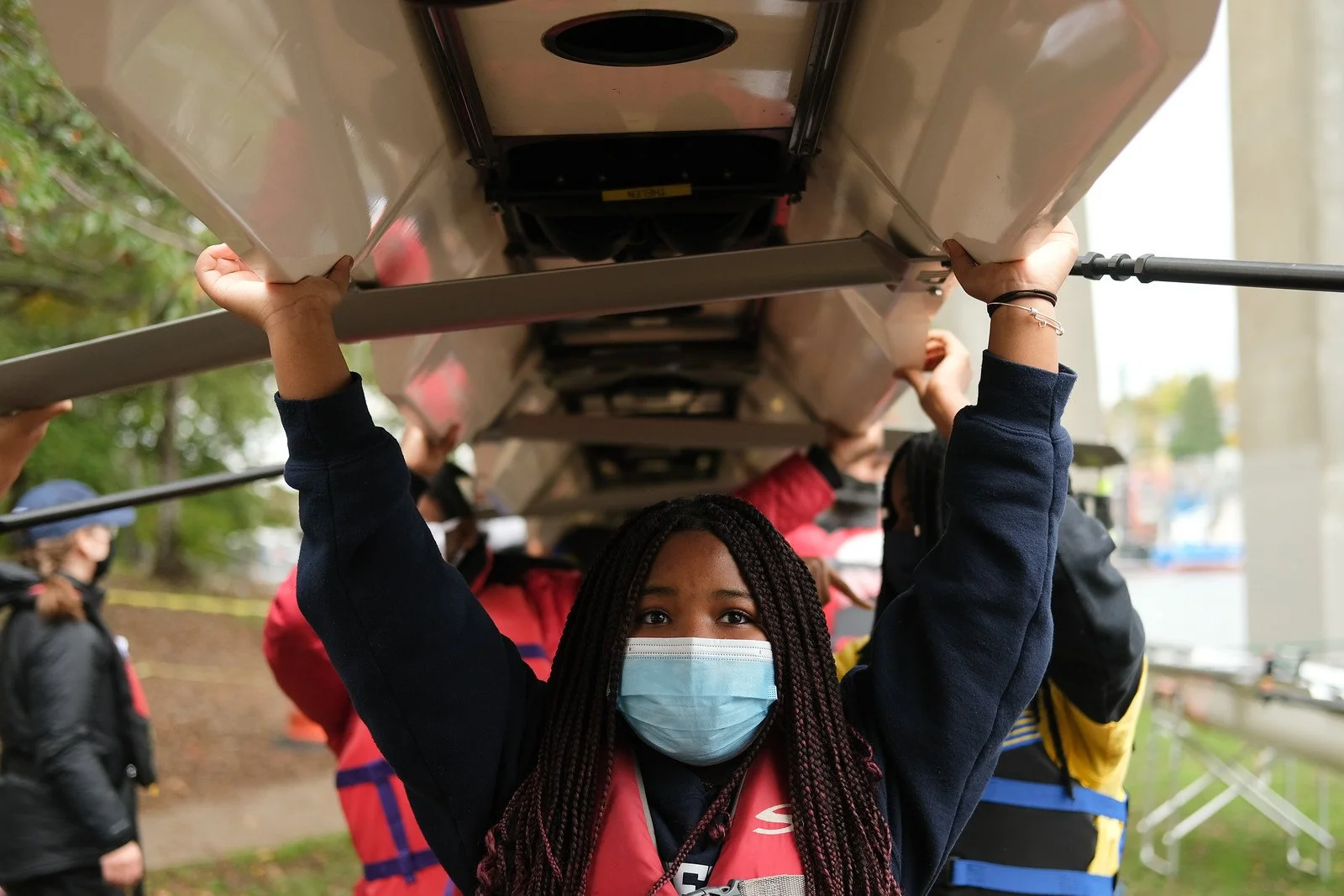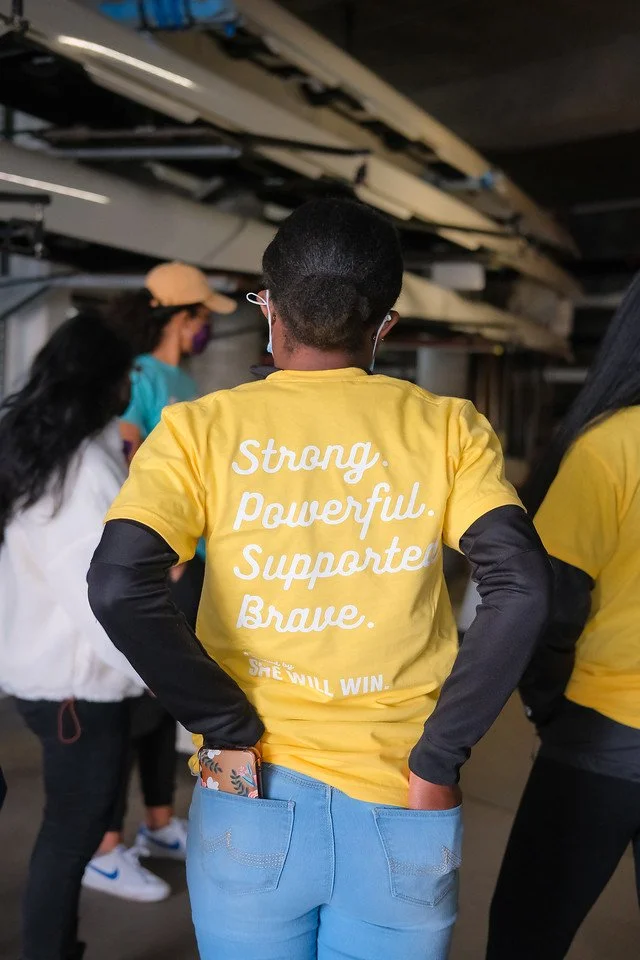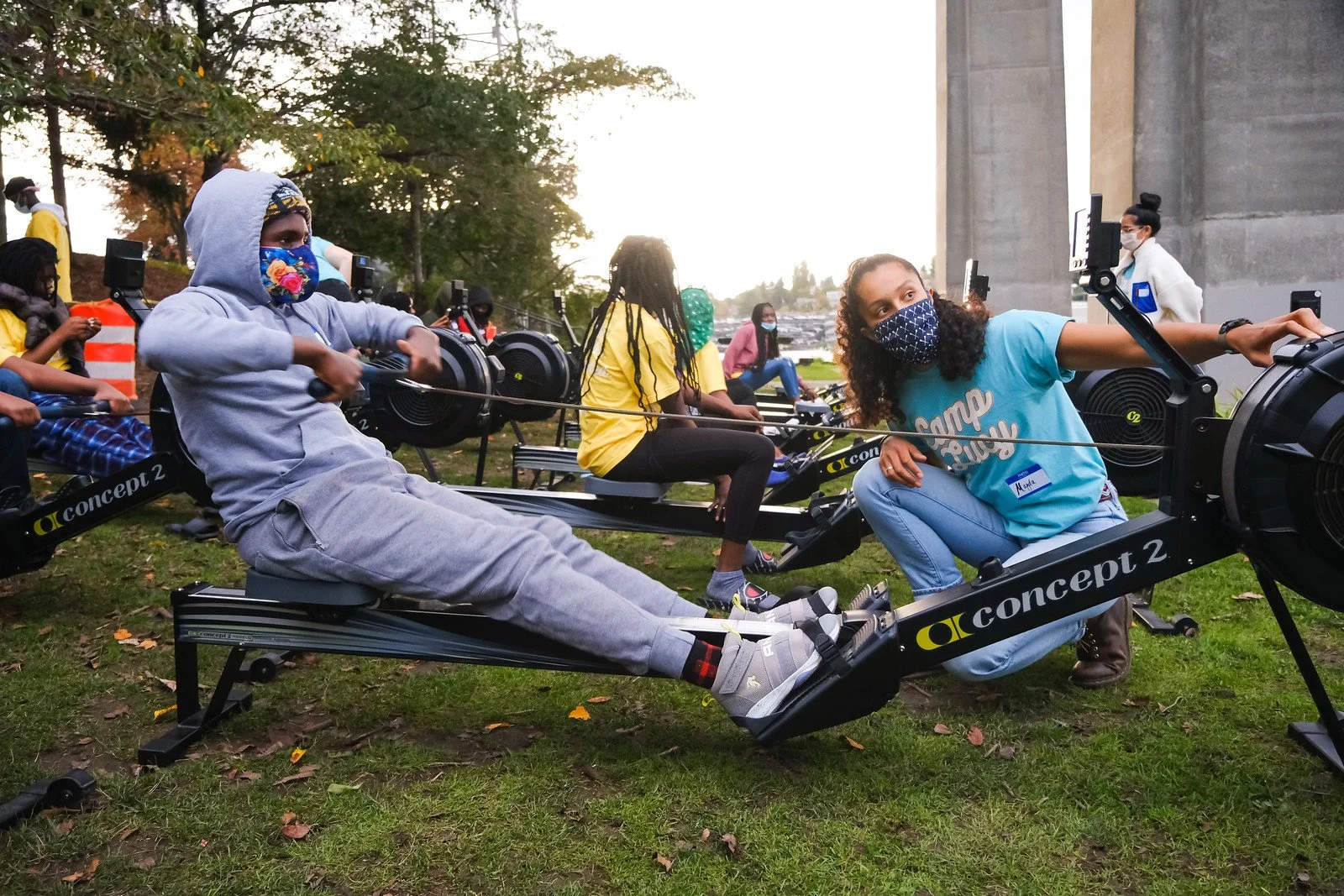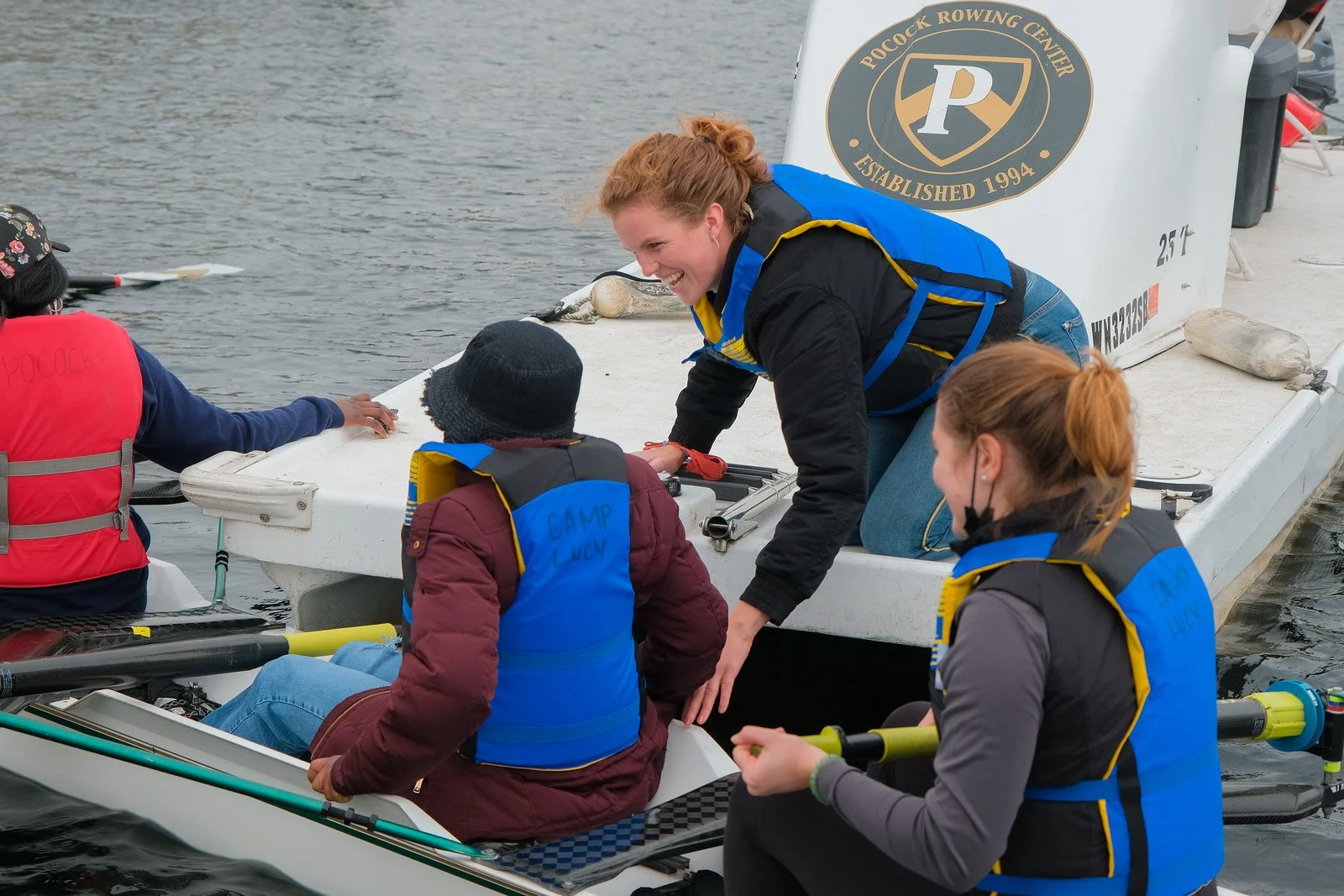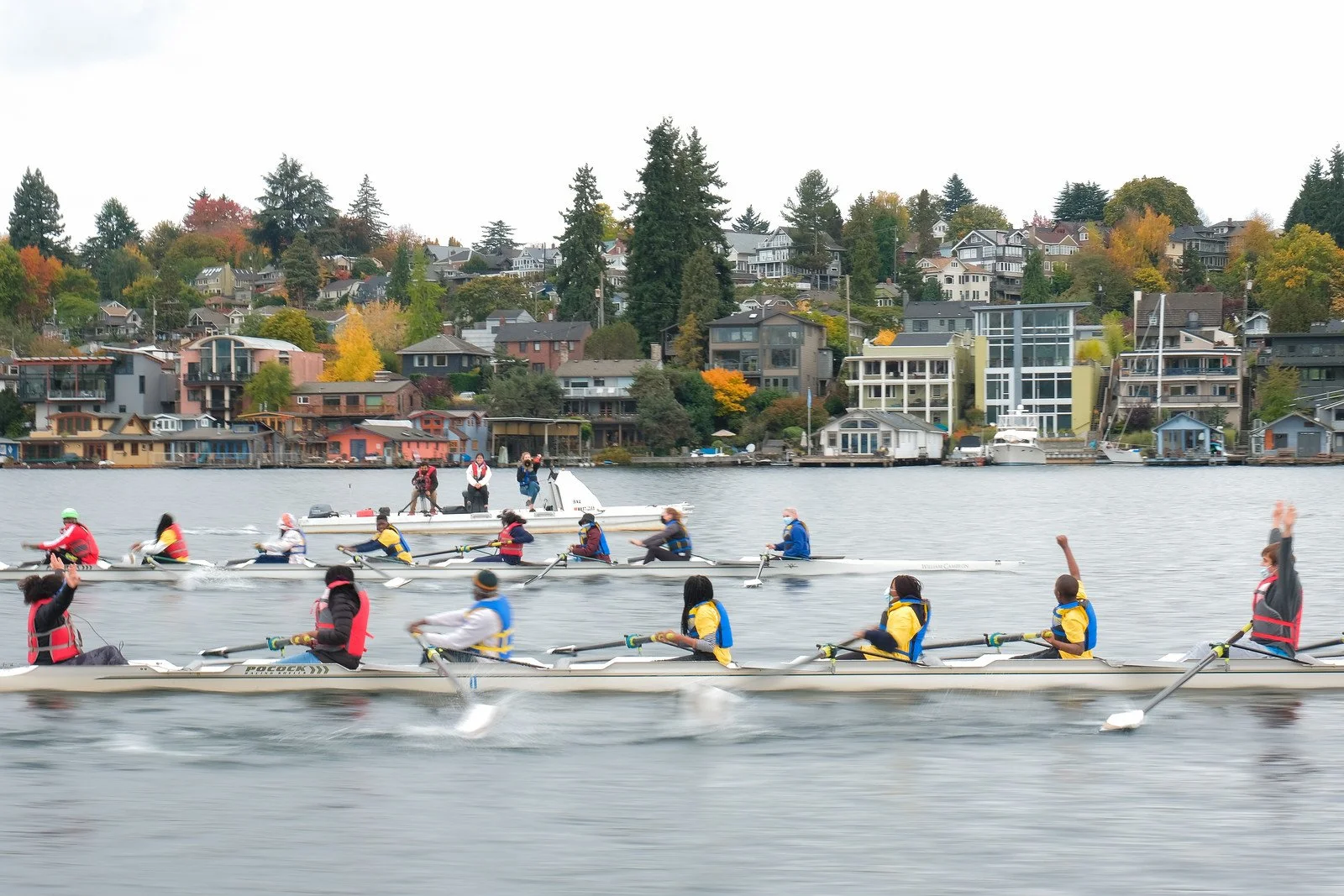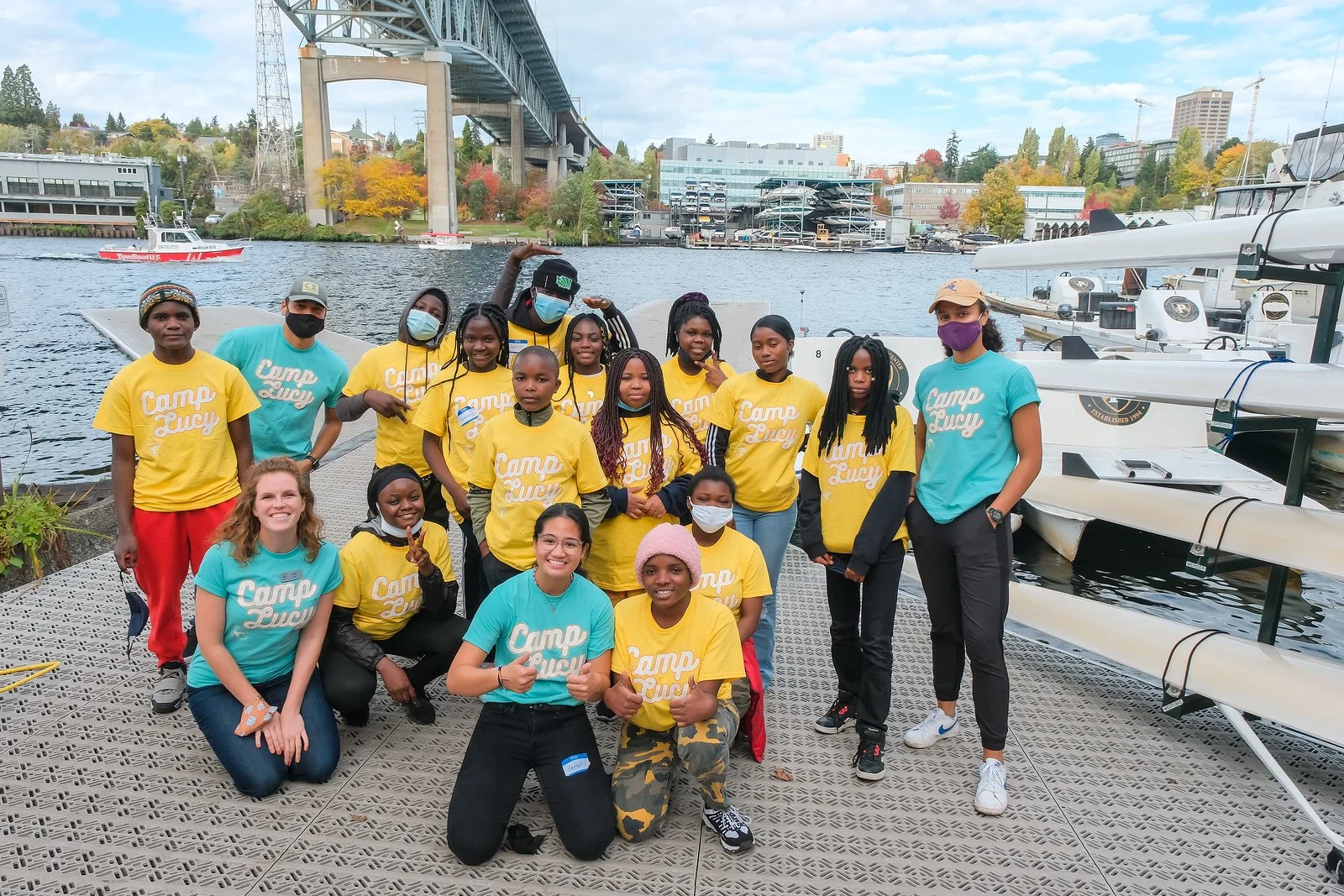Lifting the Boat and her Confidence: Camp Lucy kicked off with strong, powerful, supported, and brave young people
There is something incredibly empowering about lifting a 60-foot, 200-pound boat over your head.
“It was really hard at first, and then it was fun”
Camper, Nelly reflected after the athletes successfully picked up and carefully put in the water a rowing shell weighing more than any of these young women individually.
It takes courage to learn new things, and it takes stepping out of your comfort zone to grow. At the inaugural Camp Lucy in the fall of 2021, campers challenged themselves in safe and healthy ways, through sport and social-emotional learning. Campers learned to lift up the boat and to lift up and celebrate their peers in the process. The only negative feedback?
“I wish it <Camp Lucy> had been longer!”
In 2021, the George Pocock Rowing Foundation developed Camp Lucy in honor of Lucy Pocock, George Pocock’s older sister and a trailblazer in the sport of rowing. Lucy came to America shortly after George, during her teenage years, and took over the running of the household and care of her siblings. She was the first Ladies Champion Sculler in 1912 and the first coach for the University of Washington Women’s Rowing Team. The GPRF is honoring her while creating an inclusive space for young women to feel strong, powerful, supported, and brave. The George Pocock Rowing Foundation hopes to blaze a trail for these young women in the same way Lucy Pocock did for rowing in the Pacific Northwest.
Rowing isn’t a normalized sport in our culture. Not only that, challenges inhibit its ability to become more mainstream. Significant costs, the need for water access, as well as the necessary comfort around water the sport requires, are just a few of the sport’s exclusive characteristics. For many, transportation from their neighborhood to the boathouse isn’t realistic. And here’s some potentially hard-to-swallow honesty; the culture of rowing is not as welcoming as it could or should be if the goal is to provide everyone an opportunity to try it, which for the GPRF, it is.
In an effort to cultivate a boathouse culture that is welcoming, curious, and encouraging so all communities feel at home in the sport, and to remove some of the barriers involved in learning about rowing, the George Pocock Rowing Foundation launched Camp Lucy.
In its first iteration, Camp Lucy partnered with the Congolese Integration Network - an organization that provides critical resources for Congolese immigrants and refugees as they enter American society in Washington State. English is not their primary language and many of the young people who joined Camp Lucy were new to the United States.
All were new to rowing.
Over the course of the 3-day pilot camp, the Foundation introduced 12 young people to the sport of rowing, first on the ergs, followed by on-the-water rowing on the second and third days. In between learning-to-row sessions, the participants experienced workshops focused on communication, leadership, and trailblazing.
One camper, in particular, stood out over the weekend, demonstrating immense courage to learn new things and overcome fears around a new experience.
Camper Nelly speaks Swahili primarily, with English as her second language. Like several of the campers, Nelly was quiet and reserved, curious and somewhat apprehensive for the first couple of days, particularly during the first on-the-water session. Rowing is not an instinctual sport, and many rowers take years, if not decades to perfect this sport. Perfection in rowing is arguably a misnomer because even the most proficient rower can be impacted by the environment, other rowers, and just a plain unfortunate day.
On the first day of rowing on the water, Nelly expressed her trepidation to the coaching staff. She participated nonetheless, attempting to acquire the technique and gain some comfort. On day two, however, the instability of the shell on the water and Nelly’s uneasiness overwhelmed her. On the dock, before shoving off, Nelly admitted she was feeling unsafe in the boat. Without hesitation, Coach Zoe invited Nelly to ride along in her coaching launch boat, and while Zoe focused on getting the rowing athletes moving in unison together in the eight, Coach Gem chatted with Nelly in the launch. Together, Nelly and Gem cheered for the rest of Nelly’s crew and talked about the rowing stroke, each rower’s contribution to the shell’s momentum, and how minor adjustments can make a whole lot of difference in how the boat feels for the team. Feeling brave, Nelly asked if she could return to her seat in the eight with her crewmates and give rowing another try - she had watched the others figuring out the rowing stroke with encouragement and fun, which was what Nelly needed to witness. A swift switch on the dock was made and off they went again. At the end of the day, Nelly asked to be included in an interview with videographer, Daniel Tran. While her interview was in Swahili, C.I.N caseworker Joseph interpreted the audio, sharing that Nelly enjoyed Camp Lucy, and her favorite part was working together to carry the heavy boat.
“Not only did she choose to challenge herself despite her nerves around rowing, but she also bravely went against the grain to ask for a second shot! I’m so glad Coach Gem was able to create the safe space that Nelly needed to be able to push outside her comfort zone! That’s what it’s all about.” - Coach Zoe
Coach Zoe helps Nelly get reacquainted with her seat in the boat
Everyone celebrates a fun little duel at the end of Day 3!
Camp Lucy uses rowing as a tool for campers to build social-emotional learning and life skills. Through empowering campers physically and mentally to move through life with confidence and tools for coping when presented with challenges, the George Pocock Rowing Foundation is committed to bringing a diverse group of young people to their boathouse to learn about themselves and be a part of the Camp Lucy Legacy.
Camp Lucy’s pilot program provided a variety of impactful takeaways. Pre and post-camp surveys informed the GPRF coaches that all participants felt an increased interest in their physical, intellectual, emotional, social, spiritual, and occupational wellness.
The goal of Camp Lucy is to use rowing to show young women how awesome they are, and to create sisterhood and autonomy in a boathouse setting.
Camp Lucy Coaching Staff are all smiles after the first pilot program kicked off in 2021
How can you support this initiative?
You can donate using the button below, or participate in the annual 26 Point LU: A Marathon of Meters event. This fundraising event will raise funds and awareness for Camp Lucy and provides participants with an opportunity to row as well. For more details, click here.

